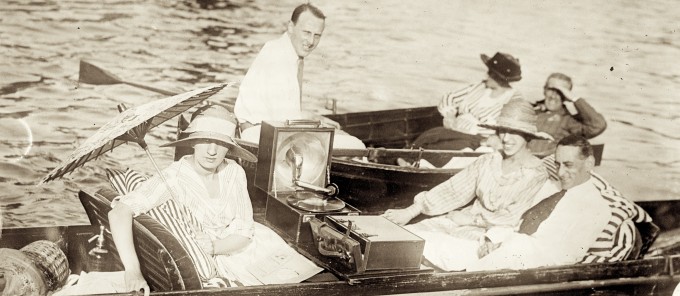
Musical listening in the age of technological reproducibility. Giovanni Morelli in memoriam.
22-24 March 2013
Conference
Musical Listening in the Age of Technological Reproducibility
Technology has revolutionised the way we listen to and store music, thus determining a significant break with the past. In addition to voice and acoustic instruments, we now have recorded sound and sounds created by electric or electronic means. Moreover, musical performances can be subject to various forms of «remediation» and listening to music has become an experience that can be prolonged and repeated in time and space. In the second half of the 20th century composers experimented with the new means of listening by making use of devices generating new sounds or transforming existing sounds. For its part, cinema established a specific way of combining images and sounds which in the more recent digital phase has become the standard form of mass communication: information becomes aestheticised, while music is included in other pre-existing symbolic fields. The technological revolution has ushered in to two highly significant social phenomena: the consumption of music as a commodity and the global reach of popular music.
A simultaneous English-Italian translation service is available
Info: [email protected]
Download the General Programme
Picture: La popularité du gramophone, Agence Rol (gallica.bnf.fr / Bibliothèque nationale de France)
Programme
Friday, March 22nd
09.00-09.30 Welcome address
A Bibliography of Giovanni Morelli in a Prologue (by Paolo Pinamonti, Università Ca’ Foscari – Venezia)
09.30-13.00 Western Art Music, Live and Mediated
Esteban Buch (EHESS, Paris), Eric Clarke (University of Oxford), Sebastian Klotz (Universität Leipzig)
Coordinator: Alessandro Arbo (Université Strasbourg 2)
Technology has enabled us to listen to music in very different contexts to those envisioned by composers. At the same time technology stimulates our analytical capacities, making the ear more demanding but also more accommodating. Digital media and streaming have further altered the way we experience music, juxtaposing distant repertoires and inviting performers to rethink ways of presenting live music.
14.30-18.00 Remediation: Opera and Dance in Television, Cinema and DVD
Alessandra Campana (Tufts University, Boston), Michele Girardi (Università degli Studi di Pavia), Gianfranco Vinay (Université Paris 8)
Coordinator: Emilio Sala (Università degli Studi di Milano)
In contemporary performance studies there has been an arguably radical redefinition of the concept of liveness. Starting from the idea of mediatised performance and the theory of «remediation», this session will tackle some emblematic cases, such as opera and dance, which are no longer simply captured on video or film but also foreshadow a new performative system.
Saturday, March 23rd
09.30-13.00 Listening with Images
Nicholas Cook (University of Cambridge), Martin Laliberté (Université Paris-Est, Marne-la-Vallée), Raffaele Pozzi (Università degli Studi Roma Tre)
Coordinator: Roberto Calabretto (Università degli Studi di Udine)
Sound films inaugurated new types of listening. Traditional narrative pathways are gradually replaced by audiovisual models in which the combination of sound and image is more elaborate. At the same time other art forms (experimental film, video art and installations) have cultivated the dream of «music for the eyes».
14.30-18.00 Recordings and the New Aura: Jazz, Rock and Pop
Vincenzo Caporaletti (Università degli Studi di Macerata), Dietrich Helms (Universität Onsnabrück), Mark Katz (University of North Carolina)
Coordinator: Veniero Rizzardi (Conservatorio Statale «Agostino Steffani», Castelfranco Veneto)
The social counterpart of industrial record production is the mass consumption of music. This development has not only transformed the ways of listening to existing repertoires but has also generated new repertoires, strictly dependent on the technical conditions of the media. The relation between technological «environment», musical text, sound product and listening now affects the whole sphere of musical production.
Sunday, March 24th
09.30-13.00 Composing and Performing with Electronic Means
Nicolas Collins (The School of the Art Institute of Chicago), Angela Ida De Benedictis (Università degli Studi di Pavia), Nicolas Donin (IRCAM, Paris)
Coordinator: Pascal Decroupet (Université Nice Sophia Antipolis)
The relationship between music and technology will be focused on in this session from two points of view: the use of technologies during real-time performances of works that include various technological devices; and compositional activities supported by new forms of knowledge that have developed thanks to first analogical and then digital technology.
14.30-18.00 Audiovisual Footage as a Source for Ethnomusicological Research
Maurizio Agamennone (Università degli Studi di Firenze), Steven Feld (University of New Mexico), Nicola Scaldaferri (Università degli Studi di Milano).
Coordinator: Giovanni Giuriati (Università degli Studi di Roma «La Sapienza»)
In ethnomusicology the use of technologies for recording and reproducing have had important effects on both archive and field research. In archive research, sound and audiovisual documentation makes available primary sources for the study of oral traditions (documents and meta-documents); and in field research new possibilities have opened up for collaboration, the production of knowledge and participation.
